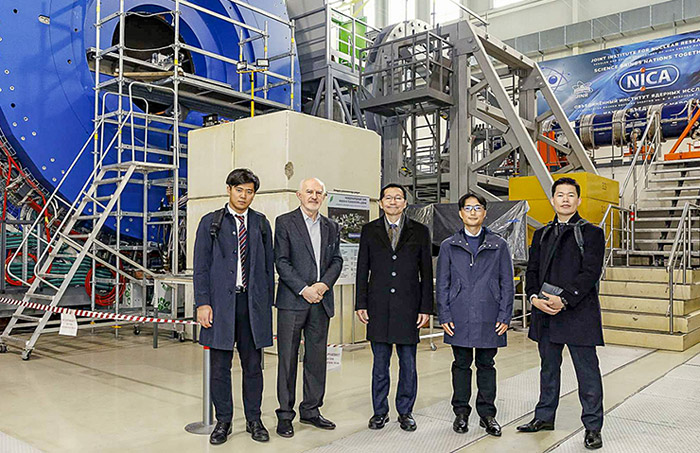
Electronic english version since 2022 |
The newspaper was founded in November 1957
| |
|
Number 44 (4792) |
Meridians of cooperation
Visit of delegation of Embassy of Japan in Russia
On 6 November, a delegation from the Embassy of Japan in the Russian Federation headed by Ambassador Extraordinary and Plenipotentiary Akira Muto visited the Joint Institute for Nuclear Research. The diplomats were introduced to the scientific infrastructure and research programme at JINR. At the meeting with JINR Directorate, prospects for deepening cooperation between Japanese research centres and JINR were discussed.
The working visit began with a tour of the Joint Institute's scientific infrastructure. The delegation visited the NICA Accelerator Complex at the Laboratory of High Energy Physics and the interactive exhibition "JINR basic facilities" at the Cultural Centre "Mir".

A meeting with JINR Directorate was held. JINR was represented by JINR Director Grigory Trubnikov, Chairman of the JINR Committee of Plenipotentiaries and Plenipotentiary Representative of Georgia Arsen Khvedelidze, Chief Scientific Secretary Sergey Nedelko, Director of the Laboratory of Nuclear Problems Evgeny Yakushev, Head of the International Cooperation Department Otilia-Ana Culicov and Deputy Head of the Department of Laboratory of Nuclear Problems Lyudmila Kolupaeva.
JINR Director Grigory Trubnikov addressed the delegation with a welcoming address. He expressed gratitude for the visit and highlighted the long history of fruitful cooperation with Japanese organizations that began in the 1970s. Director shared his impressions of the JINR delegation's recent visit to the KEK and J-PARC research centres, where they discussed continuing joint work on major international experiments.
"Our professional yet friendly relations serve as a solid foundation, a true 'scientific bridge' that helps us to maintain collaboration with our Japanese colleagues no matter what," Grigory Trubnikov emphasized. "I am confident that we will be able to expand our cooperation in the future, as we have already established an effective partnership at the level of scientists and experiment leaders."
"It is a great honor for me to visit this remarkable institute," the Japanese Ambassador said in his response. "Although I am not a specialist in physics, I understand well how important fundamental research is for the future of humanity."
Akira Muto thanked JINR for its long-standing participation in joint international projects with Japan, particularly, the T2K neutrino experiment. He also highlighted that joint work with RIKEN on the synthesis of element 113, nihonium, in the first half of the 2000s was a clear demonstration of the successful scientific partnership.
JINR Committee of Plenipotentiaries Chairman Arsen Khvedelidze and DLNP Director Evgeny Yakushev emphasized the special role of the Joint Institute as an international organization. The scientists emphasized that cooperation within JINR provides all Member States and partner countries with opportunities to use its research infrastructure and to obtain qualified expertise.
"JINR is always open to international dialogue and is ready to equally consider the interests of all participating parties. Developing scientific cooperation is fundamental for all JINR Member States," Georgia's Plenipotentiary Representative at JINR concluded.
"Today's science cannot develop in isolation and requires global cooperation," Evgeny Yakushev said. "Cooperation with Japan, a leader in global science, is especially important for JINR. We want to exchange experiences with colleagues, to jointly develop new experimental facilities and to carry out research both in Dubna and at Japanese scientific organizations."
Deputy Head of the Department of Neutrino Physics at the Laboratory of Nuclear Problems Lyudmila Kolupaeva discussed the specifics of fundamental research in elementary particle physics. "Implementing major projects, such as T2K in Japan or NICA in Dubna, requires the united efforts of major international collaborations. No country in the world can implement such research alone," she emphasized. "JINR has unique experience in neutrino physics that we are ready to share with our Japanese colleagues."
Head of the JINR International Cooperation Department Otilia-Ana Culicov highlighted the Joint Institute's well-developed social infrastructure and proposed holding "Japanese Culture Days" in Dubna with the support of the Embassy.
At the conclusion of the meeting, Grigory Trubnikov emphasized that the Institute carries out exclusively peaceful fundamental and applied research, the results of which are equally accessible to all JINR Member States. Through representatives of the Embassy, Director also invited Japanese specialists to collaborate in such fields as particle physics, materials science, theoretical physics and information technologies.
The visit of the Japanese Embassy delegation allowed the identification of specific steps for the further development of promising scientific and technological cooperation between JINR and Japanese institutes.
JINR Press Office